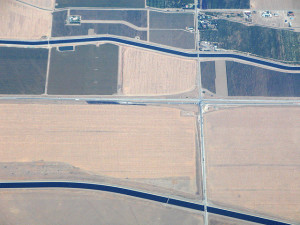Please see attached pictorial essay.

Highway I-5 and irrigation canals in California’s Central Valley. Photo by Doc Searls, and used under a Creative Commons license.
Module 7 is simply a week for catching up and reflecting—though I am asking you to do one new thing.
We’re about to head into a unit on water resources—and more specifically how different cultures have built systems that deliver water to cities and farms. I’d like you to leave one each of the following in a comment on this post:
That’s three things total: one observation, one question, and one quote.
Then, respond thoughtfully to three other people’s comments; they need not be people in your assigned group. (Also, as we move into the second half of the semester, we’ll be doing more group work outside of our assigned groups, so pay attention to who is saying smart things so that you can invite that person to work with you on a future project.)
I’ll be using your observations, quotes, and questions to shape our reading in modules 8, 9, and 10, so please select topics of interest to you.
I’ll leave a comment as an example.
1.
“The Pilgrims and America’s First Thanksgiving” was the basic elementary school lesson according to most of the “My First Thanksgiving” posts that I have read. The basic understanding that for a brief moment in history, all was well between the pilgrims and Native Americans. There is a lot of factual information in this but there is also lots of facts missing.
2.
I think that it would be hard to not find the differences in how the articles were written interesting. People these days usually thrive on drama and this is a very dramatic argument even in today’s politics. However I find that with reading upon any topic it is important to check other sources and try to weed out the hard facts and create your own opinion on the topic.
3.
I find these articles much more interesting than those in part 2. They provide a first person feeling to the story. I can remember sitting down next to my great grandfather and listening to his story about WW2. Now his opinion played a huge part in these stories so not everything that he said about the European countries can be taken for the truth, but it sure helps you build a good idea of what happened in the eyes of someone that was there for the event.
4.
I think that it would be hard not for a historian to create an opinion on the “First Thanksgiving”. That is how our minds work as people. The trick is to put your opinion aside and search for the truthful facts. I think that it easy to see that historians have changed the common persons knowledge of the past. They are the ones writing school books and when they leave parts of history out or only telling part of the story, it is equivalent to being completely biased. There are countless historic events that are left out of school books. And the youth learning from these books have no idea of the full story.